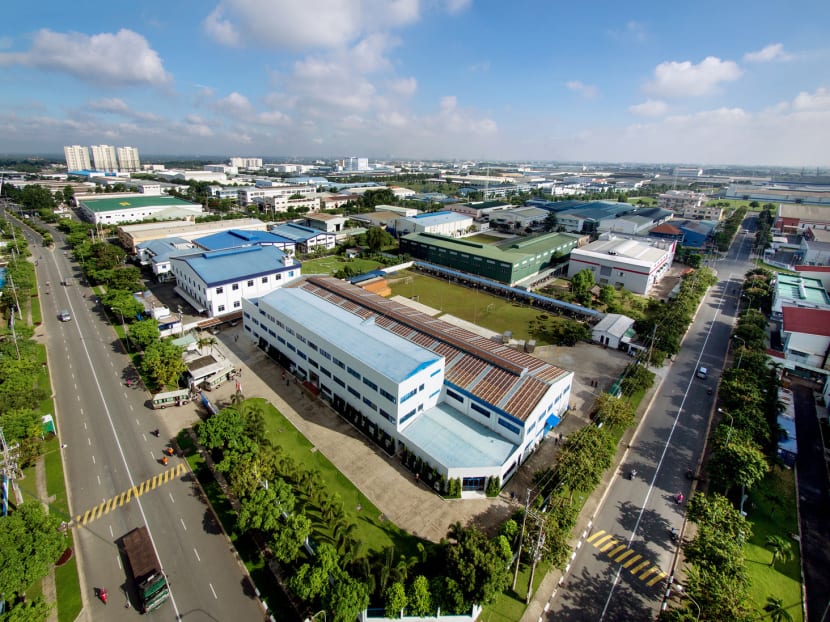Low-cost labour, rising consumerism draw Singapore businesses to Vietnam
SINGAPORE — Super Group, a household brand in Singapore best known for its 3-in-1 instant coffee, has an office with about 200 employees in Sembcorp’s Vietnam-Singapore industrial park (VSIP) in Binh Duong province. The company set up its first office and plant in Vietnam in 1998, when it identified the country as one of the first overseas markets to expand its distribution of instant food and beverage products.

Sembcorp’s Vietnam-Singapore industrial park (VSIP) in Binh Duong is one of 10 operated by Singaporean firms. Together, the VSIPs have attracted more than S$11 billion in investments. Photo: Sembcorp
SINGAPORE — Super Group, a household brand in Singapore best known for its 3-in-1 instant coffee, has an office with about 200 employees in Sembcorp’s Vietnam-Singapore industrial park (VSIP) in Binh Duong province. The company set up its first office and plant in Vietnam in 1998, when it identified the country as one of the first overseas markets to expand its distribution of instant food and beverage products.
Another Singaporean company, CEI, a contract manufacturer of printed circuit boards, began production in Vietnam in 2006, and now exports its output to markets in the United States, Europe and Asia. It currently employs 155 staff at VSIP Binh Duong.
VSIP Binh Duong is one of 10 industrial parks located across Vietnam run by Singapore corporations. The smallest is the size of Pasir Ris Park and the largest is nearly three times the area of Toa Payoh estate. Plans are under way to expand or build more of such industrial parks with more Singaporean companies expected to head north to tap on the rising consumerism as well as the young low-cost workforce in Vietnam.
Mr Ivan Tan, group director, South-east Asia and Oceania group at International Enterprise Singapore, said: “We have been partnering Singapore companies closely in their overseas expansion, and these include industrial park developers Ascendas SingBridge, Mapletree and Sembcorp. Over the years, we have been supporting their park developments by helping them navigate the landscape, which includes sharing Vietnam’s latest industrialisation needs and requirements, and facilitating their discussions with relevant government authorities and regulators.”
The first Singapore-run industrial park in Vietnam began operations in 1996, after both countries inked a landmark agreement to build these parks and step up economic co-operation. Two decades on, the 10 industrial parks operated by Singaporean firms Sembcorp, Mapletree and Ascendas-Singbridge have together attracted more than US$8 billion (S$11 billion) in investments, with over 600 tenants employing over 155,000 people, according to IE Singapore and the Singapore Business Federation.
Sembcorp has seven VSIPs across Vietnam, with four in the northern part of the country near Hanoi, one in Quang Ngai, in central Vietnam, and two close to Ho Chi Minh City in the south. The industrial parks range from a size of 150ha to 2,045ha. Within Sembcorp’s industrial parks, Singapore companies account for 11 per cent of the 630 tenants that come from 30 countries and territories.
“The Singapore companies are small-and-medium enterprises in various industry sectors including electronics and electrical, precision engineering, chemicals, food and furniture,” said Mr Kelvin Teo, chief executive of Sembcorp Development. The other industrial parks are run by Mapletree and Ascendas-Singbridge, including Mapletree Business City in Binh Duong that occupies 71ha, the size of Pasir Ris Park.
Last Wednesday, Singapore and Vietnam signed a memorandum of understanding to explore two new expansions in the provinces of Binh Duong, near Ho Chi Minh City, and Bac Ninh, near Hanoi. This will potentially add 1,500ha to Sembcorp’s original gross land area of 6,660ha.
“In the last two years, with Vietnam signing free trade agreements with several countries and in anticipation of the upcoming Trans-Pacific Partnership, many companies have set up manufacturing operations in Vietnam, also contributing to the VSIP’s occupancy,” said Mr Teo.
Following in the footsteps of companies such as Super and CEI, more Singaporean firms are looking northwards. In the recent 2015-2016 Singapore Business Federation’s National Business Survey, Vietnam was ranked the second-most popular market, after Myanmar, into which the organisation’s member companies were most keen to venture out of Singapore.
The manufacturing and consumer sectors are the two biggest draws.
“Manufacturing is a key sector given the competitive costs of production in Vietnam. Foreign investments in manufacturing will also drive demand for utilities and transportation needs, which are areas Singapore companies can (get involved) in. There are also other infrastructure needs in utilities, power and urban development as the country develops socially and economically. Meanwhile, consumer sectors like food and retail form another potential opportunity, given the young, growing middle-class and large 90 million population in Vietnam,” said Mr Tan.
Super Group said: “Located in a strategic position for foreign companies with operations throughout South-east Asia, Vietnam is an acceptable export hub to reach other Asean (Association of South-east Asian Nations) markets. This is one of the key considerations when the management contemplated access and proximity to neighbouring markets.
“The availability/abundance of labour within Vietnam, is also one of the key factors influencing our manufacturing capabilities and capacities.”
“In view of Vietnam’s availability of huge and relatively young work force, talented and educated workers, it has been relatively easy for CEI Vietnam to recruit operators. Being situated in VSIP, it is also easier to resolve custom and duty matters. Most of our customers are either foreign enterprises residing in Vietnam or overseas,” said Mr Sean Yee, general manager for CEI International Investments (Vietnam).





